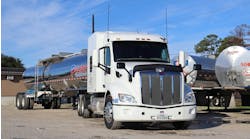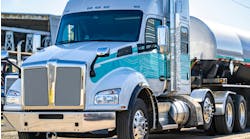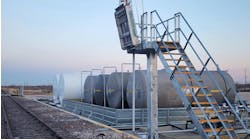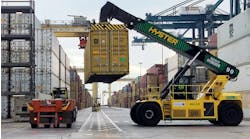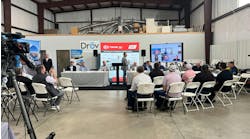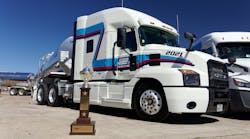From the time the management team at Lacy’s Express joined National Tank Truck Carriers in 1983, they were in the hunt for the association’s most prestigious safety award. They finally brought home their first Heil Trophy this year.
Pedricktown, New Jersey-based Lacy’s Express was one of two top champions in NTTC’s 2021 North American safety competition. The tank truck carrier claimed the coveted safety trophy in the Sutherland division for fleets with annual operations covering 15 million miles or less.
Lacy’s Express was a Grand Award recipient with a .000 accident frequency in the less-than-3.5 million miles class. The fleet also was recognized for safety improvements from 2020 to 2021.
More safety program recognition came in September when Steven Grabas, Lacy’s Express safety director, was named 2021 Safety Professional of the Year in the Sutherland division. Grabas was honored during the NTTC Safety & Security Council’s annual awards banquet in Houston, Texas.
“Earning our first Heil Trophy was an overwhelming experience,” says William (Bill) Ferrell Jr., president of Lacy’s Express. “This was a humbling experience after collecting a multitude of Grand Awards for safety in our mileage category for more than 25 years.
“My thanks go out to our drivers, mechanics, and everybody else on our staff. They put in a lot of hard work for us. It takes a full team effort day in and day out to build a trophy-winning safety program.
“We’ve tried to keep the spotlight on this incredible accomplishment by promoting the safety trophy with our customers, our local chamber of commerce, and the New Jersey Trucking Association. We also decided it was time to add a new space to show off the Heil Trophy along with all of the other safety awards Lacy’s Express has earned over the years.”
It should be noted that the Lacy’s Express earned recognition for outstanding safety performance year-over-year while operating over some of the busiest and most congested highways and roads in the United States. All operations are east of the Mississippi River, with the heaviest concentration extending from the mid-Atlantic region south to the Carolinas.
With its company fleet of 26 tractors, three owner-operator tractors, 92 tank trailers, and 26 ISO tank container chassis, the regional carrier hauls a range of cargoes, 60% of which are classified as hazardous. Roughly 90% of the cargo is liquid waste.
Family matters
From the very beginning, the operation was a family enterprise. In 1960, Bill and Eileen Ferrell (Bill Jr.’s parents) started a fuel oil distribution business called Ferrell’s Oil. Two years later, they launched Ferrell’s Trucking, a carrier that hauled glass bottles and produce.
Several years later, they purchased a local trucking company named Lacy’s Express that was owned by five local businessmen. Founded by Lacy DiPrinzio, the fleet started out as DiPrinzio’s Motor Freight and was later renamed Lacy’s Express when incorporated.
The Ferrells initially continued operating both the Ferrell’s Trucking and Lacy’s Express. However, within a few years the family decided to merge the two entities under a single name.
“Since Lacy’s Express was already an established and recognized name in the less-than-truckload and truckload sectors, our parents made the decision to keep the Lacy’s Express name,” Bill said.
By the early 1970s, the LTL side of the business was becoming more challenging. Bill tried to convince his parents to drop LTL and focus on more profitable work.
“Since becoming a truckload carrier for Dupont in 1969, I saw that this work offered many opportunities to grow our company,” he said. “When our father suffered a heart attack in 1974, I convinced our mother to abandon the LTL business. Our truckload business continued growing, sometimes faster than we could keep up with.”
A key move in the effort to develop new business came in 1980 when Lacy’s Express applied for a license to transport hazardous waste. At the same time, the carrier purchased Ruhl Transportation.
“Upon successfully obtaining our waste transporter license, we bought our first three tank trailers for use in handling the Dupont business,” Bill recalled. “Since then, we’ve continued to add more liquid bulk business and tank trailers. We’ve also continued to seek new opportunities for diversification.”
Moving ahead
Diversification has brought significant investment in intermodal equipment, including drop-frame tank container chassis and a heavy-lift machine for lifting, grounding, and storing ISO tank containers. The fleet also has added roll-off trailers and roll-off containers for waste handling.
Third-generation family members helping Bill run the operation, and identify diversification and expansion opportunities are his sons Bill III and Jason. All three Ferrells have valid commercial driver licenses. That was a critical factor over the past couple of years due to transportation system disruptions caused by the COVID-19 pandemic.
“We were able to keep trucks moving, and we never skipped a day’s work during the COVID-19 shutdown,” Bill said. “My sons and I hauled quite a few loads over the course of those months of shutdown, as did our team of dedicated drivers.”
The biggest challenge was finding replacement drivers during the pandemic shutdown, and that challenge continues today.
“As a smaller northeastern tank truck carrier, we are facing a severe driver shortage,” Bill said. “We’d hire 10 drivers right now if we could find them. We could double the size of our operation if we could get the drivers. We’re still having to turn down loads.
“About 80% of our fleet is running right now, and we are bringing on a few more drivers. A few drivers we employed previously have returned from other driving jobs.”
The biggest competition for drivers comes from online retailers such as Amazon. Those companies are adding more warehousing in southern New Jersey, where Lacy’s Express is located, and are hiring many drivers for shuttle work.
Despite the stiff competition for truck drivers, Lacy’s Express hasn’t relaxed its requirements for the driver applicants it considers. “Attitude is a big factor, but we also want experienced drivers with no log violations and no driving-under-the-influence convictions,” Bill said.
The average age of applicants is 48 years old, and most have 18 to 20 years of over-the-road truck-driving experience. All recent hires have had cargo tank experience. The fleet management does all it can to make the job attractive to these veteran drivers.
Pay ranges from $80,000 to $100,000 and the carrier does its best to ensure more home time. “In many cases, we can tailor work to the driver,” Bill said. “As a family-owned company we can provide more personal attention to our employees.”
Newly hired drivers go through a two-day orientation and at least two days of on-the-job training with the equipment they will be operating. All of the drivers at Lacy’s Express attend quarterly safety meetings.
Equipment upkeep
New hires find out quickly that the fleet’s Peterbilt tractors are packed with safety technology. All of the tractors have the Bendix Wingman Advanced system that includes collision avoidance and lane departure warning technology. Russco forward-looking, on-board cameras were specified on recommendation of the carrier’s insurance company.
Peterbilt Model 389s (in sleeper and daycare configurations) make up about 90% of the company tractors in the fleet. Peterbilt 567 sleepers are arriving to replace older Model 389s.
“We’ve been a loyal customer with the same Peterbilt dealer for 20 years,” said Bill III, Lacy’s Express vice president of maintenance. “In the past, we replaced trucks on a schedule of five years or 500,000 miles. We’ve had to modify that approach due to supply chain issues. We’re now keeping our trucks longer and buying just one or two replacements at a time.”
He adds that new tank trailers are even harder to obtain right now. “We have tank trailers back-ordered into 2023,” he said.
Lacy’s Express runs an integrated powertrain in its Peterbilt tractors. “We believe an integrated powertrain gives us the best performance and helps improve customer service,” Bill III said.
The newest equipment was specified with a Paccar MX-13 engine rated at 485 horsepower and a Paccar 12-speed automated transmission.
A four-bay maintenance shop with three mechanics and a parts manager ensure that the carrier’s 250 pieces of rolling stock are kept in top running order at all times. Preventive maintenance inspections are performed at 30- and 45-day intervals. Vehicles are lubed every 10,000 miles.
Bill III says virtually all of the vehicle maintenance work is handled in-house, including warranty repairs. On the tank trailer side, only hydrostatic pressure tests and barrel repairs are sent to other shops.
He acknowledges that parts supply has been a problem. “We built extra inventory in the last quarter of 2021, and that got us through a lot of the shortages this year,” he said. “However, we’re now being impacted by both shortages of parts and rising prices due to inflation. All of this makes it more challenging to keep the fleet in top running order, but we’ll never take any shortcuts that might jeopardize the safety of our operation.”
